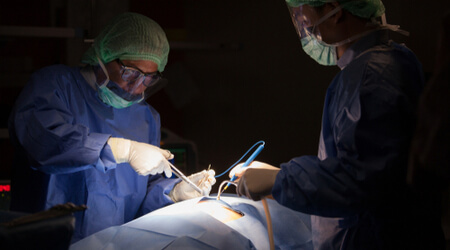
Power morcellators – medical devices used to perform laparoscopic hysterectomies, myomectomies (removal of uterine fibroids) and other surgeries – can spread undetected cancerous tissue to other parts of the body. The U.S. Food and Drug Administration (FDA) has issued a safety communication discouraging the use of these devices for removal of the uterus or uterine fibroids.
According to an article in the Wall Street Journal, Johnson & Johnson – the largest manufacturer of morcellators – called for a voluntary return of these devices from customers worldwide after suspending sales in April 2014 following the FDA’s warning. However, the company may have been aware of the potential for the devices to spread cancerous tissue as early as 2006, according to a report in the Pittsburgh Business Times.
Johnson & Johnson’s morcellator products include Gynecare Morcellex, Gynecare X-Tract and Morcellex Sigma.
If you have developed cancer that you believe may be related to the use of a power morcellator in surgery, your best course of action is to consult with an experienced South Carolina defective medical device attorney.
Contact our South Carolina power morcellator injury lawyers at Joye Law Firm to find out what legal options you may have. Just Call Joye Law Firm now or use our online contact form. There is no fee for the consultation and claim review.
How Morcellators May Cause Injury to Patients
Power morcellators, also known as electric morcellators, are tiny devices with rotating blades that break up large tissue into small fragments which can then be vacuumed out of the body.
The surgical technique used with these devices allows doctors to make tiny incisions – less than 2 centimeters – for the removal of tissue such as uterine fibroids. The much smaller incisions through the stomach muscles have resulted in less pain, fewer wound complications and faster recovery for patients than non-laparoscopic surgical techniques.
However, power morcellators can cause serious complications, according to the FDA. In its safety communication dated April 17, 2014, the agency reports that an estimated 1 in every 350 women who have hysterectomies or myomectomies for uterine fibroids have unsuspected uterine sarcoma, a type of uterine cancer.
“If laparoscopic power morcellation is performed in women with unsuspected uterine sarcoma, there is a risk that the procedure will spread the cancerous tissue within the abdomen and pelvis, significantly worsening the patient’s likelihood of long-term survival,” according to the FDA’s warning. “For this reason, and because there is no reliable method for predicting whether a woman with fibroids may have a uterine sarcoma, the FDA discourages the use of laparoscopic power morcellation during hysterectomy or myomectomy for uterine fibroids.”
In an updated warning issued on Nov. 24, 2014, the FDA said the risk of spreading cancerous tissue with a power morcellator was “higher than previously understood.”
“Because of this risk and the availability of alternative surgical options for most women, the FDA is warning against the use of laparoscopic power morcellators in the majority of women undergoing myomectomy or hysterectomy for treatment of fibroids,” the FDA said in its updated warning.
Legal Help for Victims of Power Morcellator Injuries in South Carolina
You may be entitled to file a claim for compensation if you have suffered complications after surgery that involved the use of a power morcellator. You could have a right to compensation for the medical expenses, emotional trauma and other losses you have experienced as a result of cancer related to the use of a power morcellator.
Our dedicated South Carolina personal injury lawyers at Joye Law Firm are compassionate, professional and committed to pursuing justice in these cases. You can count on our power morcellator attorneys to give you a fair and honest evaluation of your claim.
Just call Joye Law Firm now or fill out our online contact form for a free case evaluation.
Sources:
- FDA: Laparoscopic Uterine Power Morcellation in Hysterectomy and Myomectomy: FDA Safety Communication
- FDA: UPDATED Laparoscopic Uterine Power Morcellation in Hysterectomy and Myomectomy: FDA Safety Communication
- FDA: FDA discourages use of laparoscopic power morcellation for removal of uterus or uterine fibroids
- Wall Street Journal: Johnson & Johnson Pulls Hysterectomy Device from Hospitals
- Pittsburgh Business Times: J&J alerted in 2006 to device’s surgical risks, doctor says



























